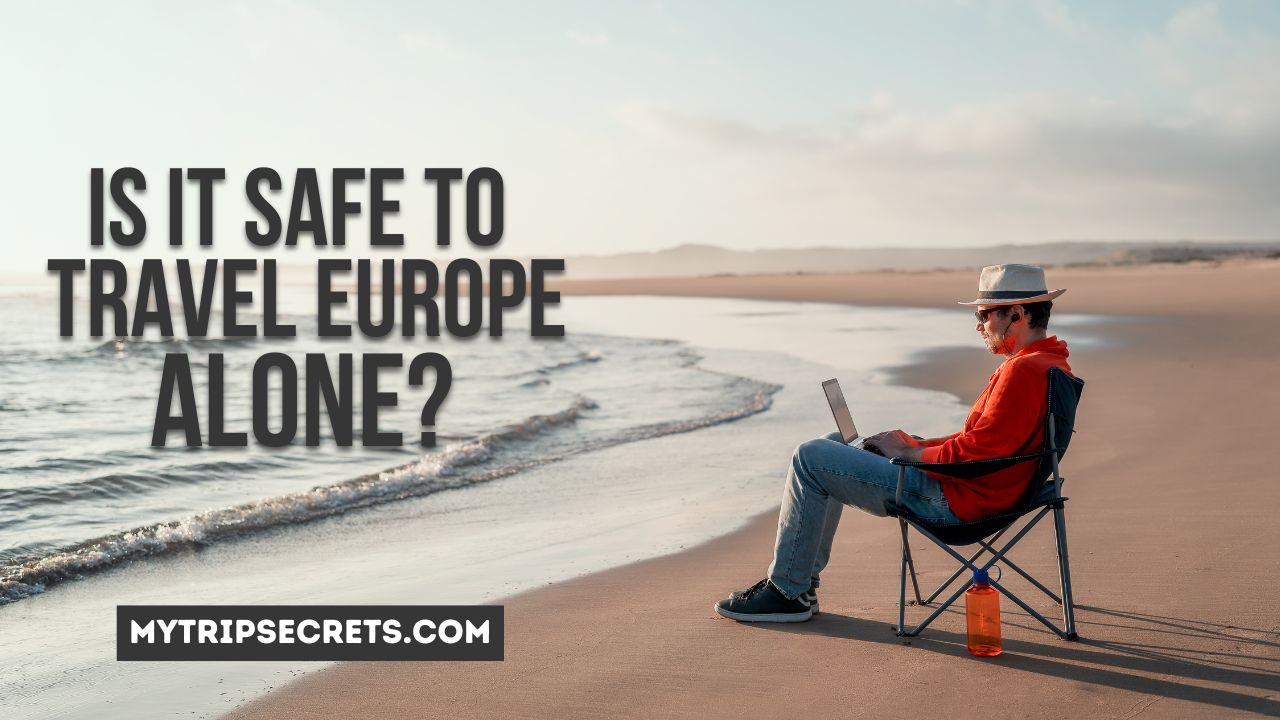A solo vacation through Europe’s stunning landscapes is an exhilarating prospect, promising unrivalled freedom and discovery. As solo travel becomes more popular, many people wonder, “Is it safe to travel alone in Europe?” This article aims to address this worry by giving a thorough examination of the safety dynamics connected with solo travel across Europe’s diverse continent. Each destination, from hectic urban centres to picturesque countryside retreats, poses unique considerations for the lone explorer. In this excursion, we’ll navigate through critical safety recommendations, cultural insights, and practical information to empower and ensure a safe and satisfying solo travel through Europe’s rich tapestry of history, art, and natural beauty.
Contents
A Guide to Safe Solo Travel in Europe
Solo travel has transitioned from a niche pursuit to a widely embraced form of exploration. However, persistent misconceptions and fears continue to shape perceptions. Let’s delve into the evolving landscape of solo travel and its increasing popularity.
Factors Influencing Safety
Destination-specific Considerations:
| Country | Safety Rating | Key Safety Considerations |
|---|---|---|
| France | 8.5/10 | Vigilance against pickpocketing in crowded areas. |
| Germany | 9.0/10 | Generally safe, but awareness of local traffic rules. |
| Italy | 8.0/10 | Caution against scams, particularly in tourist spots. |
| Spain | 8.2/10 | Common petty theft; safeguard personal belongings. |
| Switzerland | 9.5/10 | Overall high safety; adherence to mountain safety crucial. |
Time of Travel
- Peak Tourist Season vs. Off-Peak:
- Peak Season: Crowded but heightened security.
- Off-Peak: Quieter, with some services potentially limited.
- Weather Considerations:
- Summer: Pleasant weather but increased crowds.
- Winter: Quieter, but certain attractions may close.
Practical Safety Tips
Research and Planning
- Pre-trip Research:
- Explore local customs, traditions, and laws.
- Identify safe neighborhoods and areas.
- Detailed Itinerary:
- Share your itinerary with trusted contacts.
- Keep digital and physical copies of essential documents.
Communication and Connectivity
- Staying Connected:
- Regular check-ins with family or friends.
- Utilize messaging apps with location-sharing features.
- Local SIM Cards or International Roaming:
- Research and choose a cost-effective option.
- Ensure phone compatibility with local networks.
Accommodation Choices:
- Hostels:
- Generally safe, especially reputable chains.
- Consider mixed or female-only dorms for added security.
- Hotels:
- Higher security, but cost may be a factor.
- Scrutinize reviews for insights into safety measures.
- Airbnb:
- Verify hosts and read reviews.
- Choose accommodations in well-lit, populated areas.
Transportation Safety
Modes of Transportation:
| Mode | Safety Considerations |
|---|---|
| Public Transportation | Generally safe, especially on well-traveled routes. |
| Rental Cars | Adherence to local traffic rules is crucial, especially in unfamiliar areas. |
Personal Safety Measures:
- Avoiding Risky Areas:
- Stay informed about areas with higher crime rates.
- Rely on local recommendations for safe locales.
- Trusting Instincts:
- Listen to your instincts; if something feels off, it probably is.
- Exercise caution when accepting invitations from strangers.
Solo Female Travel
Solo travel empowers women by encouraging independence, self-discovery, and cultural immersion. With careful planning, awareness, and confidence, solo female travellers can navigate the world safely and have engaging experiences that contribute to personal growth and resilience.

- Safety Concerns:
- Street Harassment: Maintain confidence and awareness; familiarize yourself with local emergency contacts.
- Accommodations: Opt for secure entry and well-lit lodgings.
- Precautions and Empowerment:
- Self-defense Classes: Consider basic self-defense training.
- Local Contacts: Connect with local female travelers or communities for valuable advice.
Real-life Experiences
To provide a realistic perspective, here are firsthand accounts from solo travelers navigating Europe alone. These stories illustrate the diversity of experiences and offer valuable insights into staying safe during solo adventures.
Frequently Asked Questions (FAQs)
- What are the key safety considerations for solo travelers in Europe?
Understanding the safety landscape is crucial for solo travelers. Research destination-specific factors, such as safety ratings and prevalent challenges in each country. Take into account the time of travel and weather conditions, as these factors can significantly influence your safety and overall travel experience.
- How can solo travelers enhance their personal safety in Europe?
Boosting personal safety involves adopting a proactive approach. Avoid risky areas by staying informed about neighborhoods with higher crime rates. Trust your instincts, exercise caution in unfamiliar situations, and maintain situational awareness. These practices contribute to a more secure solo journey.
- Is Europe safe for solo female?
Yes, solitary female travellers in Europe are often safe. Many European countries prioritise tourist safety due to well-established infrastructure, cultural variety, and a strong emphasis on tourism. It is, nevertheless, critical to take common-sense precautions, remain attentive in strange circumstances, and choose accommodations intelligently. Solo female travellers can confidently enjoy Europe’s rich tapestry with a high level of security by being informed and implementing common safety precautions.
- What precautions should solo female travelers take when exploring Europe alone?
Solo female travelers can prioritize their safety by taking specific precautions. Addressing street harassment involves building confidence and awareness, while choosing secure lodgings with well-lit entry points enhances overall safety during accommodation stays.
- What age can you travel alone in europe?
The minimum age for solo travel in Europe varies by country and mode of transportation. Airlines typically allow children as young as 5 to fly alone with an accompaniment service. Some countries, however, may have age limitations for unaccompanied minors entering or travelling inside their boundaries. To ensure a safe and pleasant solo travel experience for children, it is critical to examine the regulations of both the departure and arrival destinations, as well as the policies of transportation providers.
- What transportation safety tips are recommended for solo travelers in Europe?
Navigating transportation safely is paramount for solo travelers. Opt for reputable transportation services and avoid traveling late at night in unfamiliar areas. Planning your routes carefully ensures that you can travel confidently and securely throughout your journey.
- How can solo travelers choose safe accommodations in Europe?
Selecting safe accommodations is a critical aspect of solo travel planning. Research and read reviews to understand the safety features and experiences of other solo travelers. Consider reputable options from well-known providers and prioritize accommodations in well-lit and populated areas for added security.
Conclusion
embarking on a solo tour through Europe with information and preparation may be an empowering and meaningful experience. Solo travellers can confidently explore the continent’s different landscapes by dispelling safety fears, recognising destination-specific dynamics, and employing practical suggestions. Those that embrace the journey properly will experience cultural immersion, personal growth, and the joy of independent exploration. As you embark on your solo European adventure, keep in mind that safety is a dynamic practice that requires alertness, adaptability, and trust in one’s intuition. Trust the guide, trust yourself, and relish in the many treasures that lie, making your solo trip through Europe a genuinely transformational and unforgettable experience.
In conclusion, solo travel in Europe is not only feasible but also immensely rewarding when approached with preparation and awareness. By understanding destination-specific factors, embracing practical safety tips, and learning from real-life experiences, solo travelers can confidently explore the diverse beauty that Europe has to offer.

